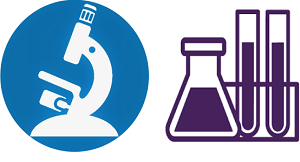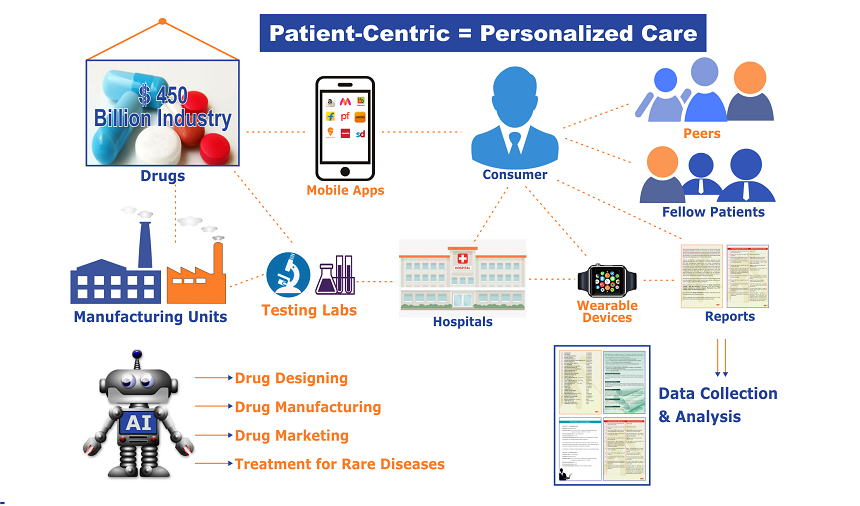Artificial Intelligence (AI) has changed the entire business operations in the Pharma and Healthcare industry. It is estimated that the pharmaceutical industry is worth $450 billion globally, and it takes around $2.6 billion for a drug to get officially authorized and bring into the market for public consumption.  Today, pharma companies are investing in tech companies and bringing in AI-based applications for better drug development. Initially, AI in pharmaceutical industry was applied in the areas of drug discovery for predicting molecule-target bonding, to identify biomarkers, to discover new drug indications, clinical trials and to improve manufacturing efficiencies.
Today, pharma companies are investing in tech companies and bringing in AI-based applications for better drug development. Initially, AI in pharmaceutical industry was applied in the areas of drug discovery for predicting molecule-target bonding, to identify biomarkers, to discover new drug indications, clinical trials and to improve manufacturing efficiencies.
Today we can see the use of AI technology in almost every stage of the pharma industry, majorly being data analyzing and processing. Adopting the AI and Machine Learning (ML) technology will allow businesses to reveal the astounding potential available in the pharma sector, with higher success rates especially in the research and development areas that play a crucial role in the manufacturing of life-changing drugs.
AI works as a self-learning system that continuously responds and analyses data allowing researchers to collect effective information regularly. Moreover, the more data AI analyses and responds too, the smarter it becomes, thus, continuously making advancements in the pharmaceutical industry.
The patient-centric approach means businesses need to have a multi-faceted approach. Being patient-centric means offering personalized drugs and treatments specific to people, adjusted as per genetic make-up, type of disease, their lifestyle and medical history. It deals with a faster and more accurate diagnosis, allowing more tailored responses. Thus, AI, combined with patient-centric approaches, will help provide more personalized and remote care, along with diseases prevention through tailored health and lifestyle support.
 With advancements in technology, patients have become more alert and knowledgeable as they have better access to information. These day patients interact with their peer groups and other patients through various mediums and exchange experiences, thereby, contributing to real-time data generation. As the patients have become empowered, it has improved their presence in the market, with an expectation to be heard during drug manufacturing and development process.
With advancements in technology, patients have become more alert and knowledgeable as they have better access to information. These day patients interact with their peer groups and other patients through various mediums and exchange experiences, thereby, contributing to real-time data generation. As the patients have become empowered, it has improved their presence in the market, with an expectation to be heard during drug manufacturing and development process.
AI and its benefits in patient-centric pharma strategy:
Several pharma companies and healthcare providers understand the importance of collecting patient-specific data gathered either from patients directly or through data stored in the hospital directories. The data can be even collected during the clinical trial process. For healthcare professionals, data collected through the patient pool enables them to understand various challenges they have to deal with. Whereas data gathered via touch points by the pharma companies indicates the stage of engagement. As for payers in the pharma industry, a good knowledge of market access, benefits of clinical trials and formulae lists play a crucial role. AI and ML technology help in bringing all these together with the right brand performance measurement and customized fit-for-purpose methods that help the companies to have a competitive edge in the market.
- AI technology can also be essentially used for understanding patient behavior in the use of medicines or drugs prescribed under standard care. This allows increased care for number of patients who can receive the potential therapy. This further impacts the overall progress of the disease condition.
- Pharma companies are collecting multiple data points like a patient’s genes, patient’s characters or phenotypic, molecular and other clinical data. The multiple variables that are gathered through all these research can be used to simulate and improve clinical trial outcomes and thus, reducing the time taken to finish the trials.
- In the process of data collection business need to focus on all the minute details that are present in the data features that includes complete patient history having necessary details like previous diagnosis, treatments taken, doctor/hospital referrals, various lab/tests values, and past hospitalizations. Collecting single data assets won’t be helpful as they may not contain all desirable components. AI technology helps in linking the data sets and fill in gaps for further analysis.AI-powered tools are required to determine and quantify the drivers of different patient pathways.
- Pharmaceutical companies guide and engage patients through various social media channels based on various services that they may require. These social media help in gathering deeper insights into patient profiles and real-time data that can be further used to provide tailor-made pharma services to specific patients.
Benefits of using AI in drug development:
AI technology helps in optimizing the process of drug designing by improving the R&D process by identifying new molecules, discoveries and target-based drug validation resulting in significant cost-savings, better treatment options and affordable therapies.
AI can help in improving the drug manufacturing process that involves quality control, reduced design time, reduced waste, predictive maintenance and better production reuse making the manufacturing process faster and accurate reducing human intervention and eliminating any errors.
AI can help in defining the customer journey allowing the companies to use strategies and marketing techniques that would help them to persuade the customer to make the purchase. AI will also allow companies to analyze past campaigns and design new marketing campaigns based on the historical data and through predictive analysis.
According to a study by Global Genes, 95% of rare diseases do not have single FDA approved treatment, which means AI can be used in pharmacology to find new treatments for rare diseases like Parkinson’s and Alzheimer’s.
Adopting AI technology at different stages of Drug development and creating more patient-centric strategies will enable pharma companies to provide more personalized services and care to the patients. However, some companies are just in the initial stages of understanding AI requirements, use of the technology and its various application areas.
AI has several tangible benefits to offer companies that need to focus on building strategies and applications around it. Aligning AI and ML applications with data privacy regulations and ethical standards, pharma companies can deliver great value to patients, doctors and payers driving the business.

